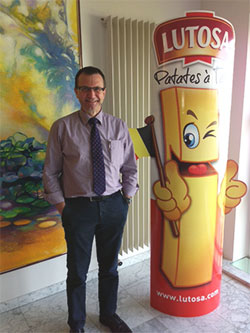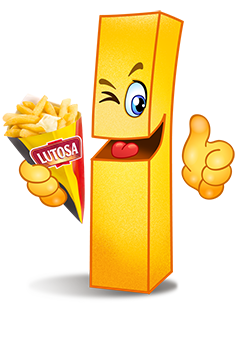On July 1 it will be one year since Lutosa has operated as a unit of McCain Foods, which officially took ownership of Belgium’s largest producer of frozen french fries and other potato specialties from Pinguin Foods after nearly a nine-month period of due diligence and regulatory approval procedures.
Meanwhile, the separate purchase of Lutosa’s retail brand business by the Findus Group was announced on February 27, 2014. The sale to a non-McCain entity, as required by European competition authorities, allows Findus to exclusively use the Lutosa name in supermarkets and other retail outlets, if it chooses, for up to seven years. The Lutosa label currently accounts for approximately 15% of the retail market for processed spuds in Belgium, and is also well established in France.
With the McCain-Lutosa merger anniversary date just around the corner, FrozenFoodsBiz.com thought the time was ripe to pay a visit to Lutosa’s Leuze-en-Hainaut headquarters and chat with Managing Director Erwin Wuyts.
“The transition has gone very well. It has been an enriching experience for both the acquired and acquiring companies, as we are learning a lot from each other,” he told this writer.
 Lutosa Managing Director Erwin Wuyts is proud of the company’s success in introducing Belgian Frites and a wide variety of other frozen specialty potato products to consumers around the world.Wuyts, who has been with Lutosa since 2009, is quite at home with the McCain organization, having previously worked in its Frima division for 16 years. During most of that period he was in charge of the Oostende, Belgium-based factory, which then packed frozen pizza, soups, prepared meals and other value-added items.
Lutosa Managing Director Erwin Wuyts is proud of the company’s success in introducing Belgian Frites and a wide variety of other frozen specialty potato products to consumers around the world.Wuyts, who has been with Lutosa since 2009, is quite at home with the McCain organization, having previously worked in its Frima division for 16 years. During most of that period he was in charge of the Oostende, Belgium-based factory, which then packed frozen pizza, soups, prepared meals and other value-added items.
The managing director’s past connection with McCain assured that the consolidation process with Lutosa would get off to a flying start. “It is a big advantage working with familiar faces, some of which now have graying hair and, like myself, may also have a few more kilos around the waist,” he commented, with a bit of self-depreciating humor.
Though Wuyts didn’t get into the potato business in earnest until joining Lutosa, as a devoted life-long consumer of fries, he already knew a lot about the product. While a university student some years back he enthusiastically studied the flavor, texture and golden-brown color of Belgian Frites regularly in the school cafeteria.
“They tasted better than mashed potatoes or rice as side dishes, so I ordered them almost every day,” recalled Wuyts. “Today, like most people in Belgium, I enjoy them once or twice a week. It’s a habit of our family to eat fries on Friday nights while talking and watching TV.”
Belgians are passionate about frites, which they insist originated in their country and therefore do not refer to them as french fries. Frites are a traditional and cherished part of the nation’s food and drink culture, along with premium chocolates, waffles, big black pots of steamed mussels (which, by the way, are always best served with frites), wild game dishes and, needless to say, top-quality beer.
The pleasure of eating thick-cut Belgian frites, typically topped with mayonnaise, curry ketchup or other condiments and served in paper cones, continues to gain popularity both at home and abroad. From the frituur snack shops of Antwerp and Brussels to the small towns and villages, to the streets of Amsterdam (where they are revered as Vlaamse Frites by the Dutch and tourists alike) and New York City, to Bali and Beijing, Belgian-style fries are hot stuff.
 The extensive Lutosa product line goes well beyond fries of numerous sizes, shapes and forms. Its two state-of-the-art plants pack more than 370,000 tons of finished products per year, including specialty items ranging from Pom’ Pin and Mashed Potatoes to Duchesse, Tartiflette, Spicy Wedges, Röstis, onion-flavored Hash Browns and Herby Diced Potatoes, to Croc’ Apéro savory snacks with seasoned mash. With more than 88% of its output exported to 111 countries, the company generated over EUR 251 million in turnover last year.
The extensive Lutosa product line goes well beyond fries of numerous sizes, shapes and forms. Its two state-of-the-art plants pack more than 370,000 tons of finished products per year, including specialty items ranging from Pom’ Pin and Mashed Potatoes to Duchesse, Tartiflette, Spicy Wedges, Röstis, onion-flavored Hash Browns and Herby Diced Potatoes, to Croc’ Apéro savory snacks with seasoned mash. With more than 88% of its output exported to 111 countries, the company generated over EUR 251 million in turnover last year.
A savvy sales crew, which has remained firmly intact since the acquisition by McCain, has been key to Lutosa’s international success. At the forefront of the global sales campaign for many years has been Dirk Desloovere. Seeing this writer shortly before a scheduled meeting with his boss, he smiled at both of us and remarked: “Remember, behind every good ceo is a strong sales team.”
Managing Director Wuyt, nodding in agreement, told FrozenFoodsBiz that the continuity of Lutosa’s successful sales organization, as well as its efficient production, logistics and marketing departments, is crucial for ongoing success.
“Nothing has changed among our talented personnel ranks,” he said. “From the factory floor to middle and executive management, we remain the same dedicated team.”
This means that the Lutosa banner will continue to fly high at trade fairs, such as the upcoming SIAL this October in Paris and the recently concluded National Restaurant Association Show in Chicago. The unit will operate relatively independently within the group structure, with its leadership reporting directly to McCain Continental Europe headquarters in France.
Like McCain, the Lutosa name is highly regarded by customers around the world. And also like McCain, the origin of Lutosa goes back to a family-owned and –operated entrepreneurial core with roots in the very soil of the potato business.
Frozen fries are naturally a major part of Lutosa’s raison d’être, but it was the development of value-added specialty products that paved the road to steady profitability. The frozen food company’s founding Van den Broeke brothers, like Harrison and Wallace McCain, did not hesitate to shift gears upward and invest resources at the proper moment to move forward. At the end of the day, their timely actions proved to be more evolutionary than revolutionary.
So, when asked about the evolution of price-driven private label producers who have made volume gains at the expense of brands in recent years, Lutosa’s managing director did not hesitate to reply, as follows:
“There is certainly no shortage of frozen fry processors, some of whom are not far from here, who cater almost entirely to the private label market. Ultimately they will have to diversify into more costly value-added items to assure profitability, and some are trying to do that.
“But keep in mind,” he continued, “that as the major growth markets today and tomorrow are far removed from Europe, the fact is that those suppliers with a respected brand-name foundation and reputation will ultimately be preferred by buyers who consistently demand top-quality deliveries without fail. One can’t continue to be the cheapest and survive. It may work for a while for those building production economies of scale to stay alive, but in the long run this is not a recipe for continued prosperity.”
With a proven track record of more than 93 years of combined expertise and service to worldwide buyers of frozen potato products between them (McCain started up in Canada during 1957, and Lutosa began operations in 1978), the two well-established brand names lack nothing in the realm of experience and reliability. – JMS





